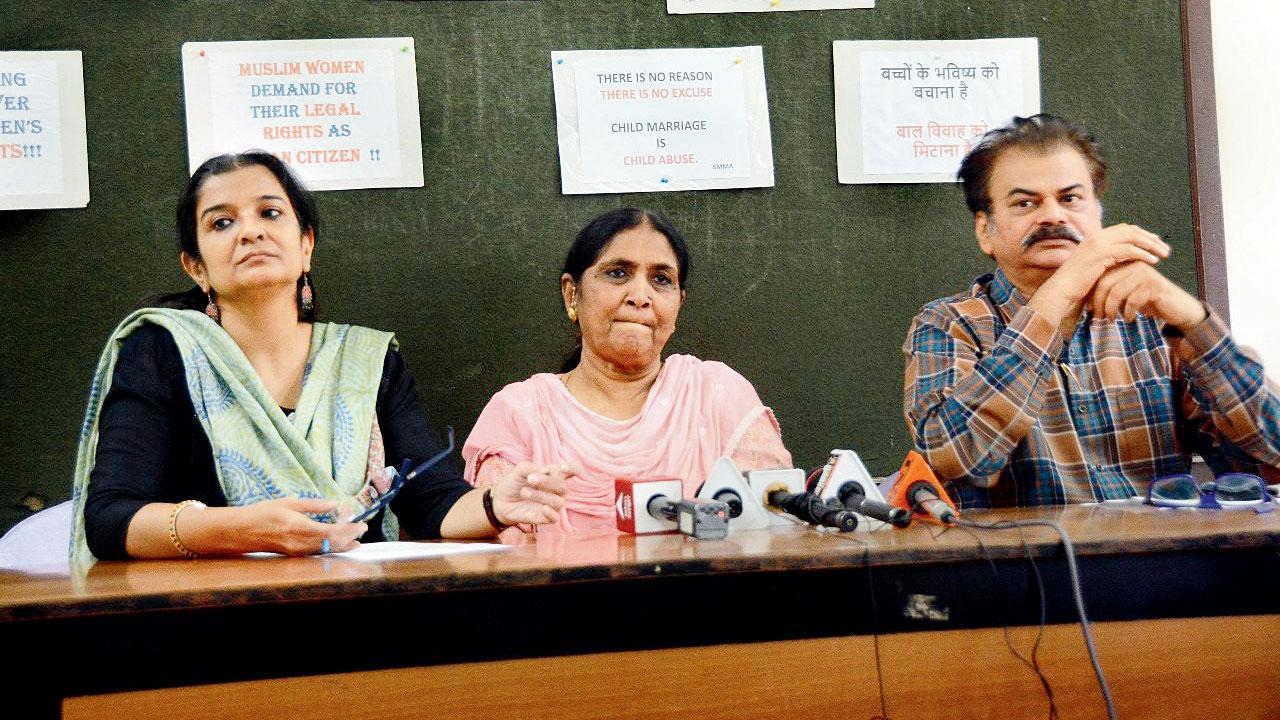Women pushed into child marriage break down as they recount ordeal; demand Prohibition of Child Marriage Act be made unambiguously available to the Muslim community

(Left to right) Noorjehan Niaz, Khatoon Shaikh and Feroze Mithiborwala at the conference yesterday. Pic/Sayyed Sameer Abedi
Tears flowed as women broke down, recounting their ordeal when they were married off as young as 14, 15 or 16 years at an emotional press conference, by the Bharatiya Muslim Mahila Andolan (BMMA) at the Mumbai Marathi Patrakar Sangh, Azad Maidan on Tuesday evening.
ADVERTISEMENT
The conference began with the BMMA’s Noorjehan Safia Niaz, Khatoon Shaikh and Bharat Bachao Andolan’s Feroze Mithiborwala stating, "The Supreme Court of India has agreed to entertain a sensitive socio-religious issue related to the sanctification of the marriage of a minor girl on her attaining puberty by Muslim personal law. It has also annulled the Punjab and Haryana High Court that validated the marriage of a 15-year-old Muslim girl. The contradictory judgments of various courts on child marriage with regard to the Muslim community emerged because the law related to child marriage is ambiguous about its application to the Muslim community. A judgment, whether of high courts or the Supreme Court can never be a substitute for law. We demand that all laws related to child marriage, Prohibition of Child Marriage Act (PCMA), 2006 or the Protection of Children from Sexual Offences (POCSO) Act must be made unambiguously and explicitly be applicable to the Muslim community so that Muslim women and girls are able to take advantage of the law of the land.”
Also Read: Kabul's mannequins, hooded and masked under Taliban rules
They added, “The PCMA, though a national law applicable to all citizens, is still not made explicitly and unambiguously applicable to the Muslim community. Supreme Court has not yet given an authoritative verdict on the same although the judgment of 2017 does say that PCMA is a secular applicable to all. There are some high courts which have said that personal laws could override the PCMA, 2006 (Punjab and Haryana High Court) and some high courts like Gujarat and Karnataka which say that PCMA, 2006 will prevail over personal laws.”
The PCMA forbids child marriages in India. A child is a person who has not completed 21 years in the case of males and 18 years in the case of girls. Niaz said, “We want the confusion cleared once and for all. It is when the law changes that society changes. Parallelly, when society changes, laws change too.”
The BMMA cited a study called ‘Seeking Justice Within Family’ which showed that 75.5 per cent of the 4,710 respondents wanted girls to be married above the age of 18. And 88 per cent wanted boys to be married above the age of 21. Yet, wishes were one thing, reality different. Out of all the respondents, it was found that 55 per cent were married before the age of 18 and out of which 15 per cent were below the age of 15.
Mithiborwala claimed that conversations on the ground showed that “young Muslim women were aspirational. Most of them said that marriage age even for girls should be 21”. It was when different women were called up to speak, that one could assess the heavy mental and physical toll these early, or early is simply a euphemism for child marriages, have taken on them.
Shaikh said, “I never saw college, I was married so early. This generation should not go through what some of us had to.” She was emotional as she said, “I lost out on my studies. Women need to make their future.”
The speakers, in fact, said that it is not just girls but also boys who suffer when they are married too early. “He has no maturity, no concept of what is marriage or responsibility. The boy has no idea that he is somebody’s husband. He simply parrots, I will do what my parents say,” they said.
Naaz Raeen, married at 14, also battling tears, said one is not mentally or even physically prepared for marriage and motherhood when so young. “I know what I have gone through. I had to look after my children alone, I lost my husband early.”
A Hindu woman, Bharati S, is part of BMMA and this cause because she believed in this being a women’s rights issue, not confined to one community. She said, as she wept on the mike, “I was married at 16, though it was not legal. I did not want to get married, but was foisted on somebody else as I was considered a burden.”
Haseena Shaikh cried as she said, “I was married at 15. Those who go through this alone know how tough this is.” Each woman was determined that their children do not go through what they had to, and have access to education.
Succinctly, the demand was that the PCMA, 2006 must unambiguously and unequivocally mention that this law is applicable to the Muslim community as well. The Muslim community is not exempt. While legalese was the base of this meet, it was the personal stories that were more powerful, as lived reality showed the true, adverse impact of child marriage.
 Subscribe today by clicking the link and stay updated with the latest news!" Click here!
Subscribe today by clicking the link and stay updated with the latest news!" Click here!







